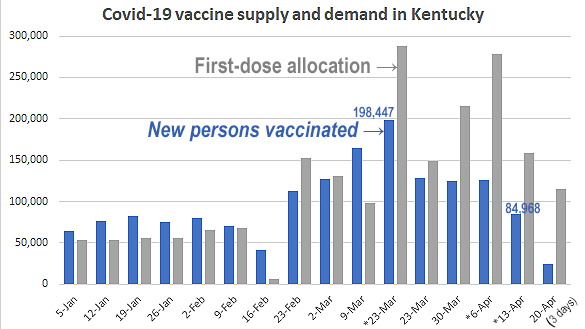Beshear and Dr. Stack: It’s not so much what they say, it’s what you say, to help Ky. reach vaccination goal and lift restrictions

Kentucky Health News chart from state Department for Public Health data
—–
By Melissa Patrick
Kentucky Health News
With the pace of vaccinations slowing, Gov. Andy Beshear said Thursday that reaching his 2.5 million goal to lift most business-capacity restrictions will require effort and encouragement by individual Kentuckians to others, not just from the governor and his commissioner of public health.
“This has to be an us,” Beshear said near the end of his regular pandemic news briefing. “One doctor to one patient, one friend to one friend.”
Earlier, he said, “We’ve always believed in personal responsibility in this state. And that’s how we have to be viewing this vaccination effort. We really need everybody to get informed. If you actually read this information, read the science, you will come to the conclusion that this thing can protect you, the vaccine, and it is safe and effective.
He added, “We’ll continue to do everything we can to encourage and to provide access. And to everybody out there, we need you to be our advocates. Talk to those around you.”
Beshear has said that when 2.5 million Kentuckians get a vaccine, he will lift all capacity restrictions on businesses and activities up to 1,000 people. So far, about 1.7 million Kentuckians have received at least one dose, leaving a gap of 800,000, which at current rates would take until early July to close.
He said the vaccines “have proven to be some of the most effective vaccines in human history. They basically eliminated death and they’ve basically eliminated major sickness and they have done it even in our most vulnerable populations,” he said.
Health Commissioner Steven Stack reinforced Beshear’s message.
“If you remain uncertain, it is very important that you are informed,” he said. “This is your choice. This is your choice to accept vaccination to protect yourselves and to protect your loved ones. Please be informed. Talk to people you trust and have confidence in; talk to your doctors, your primary care providers; ask them your questions, address them to your level of comfort. And then, please, I hope you’ll consider getting vaccinated so we can all move on with our lives.”
Beshear said he has asked for the help of local officials and business leaders to encourage their people to get vaccinated, and will be talking to “a large number of businesses” tomorrow.
He said the state has over 550,000 doses available, with no wait, for anyone 16 and over. Visit vaccinemap.ky.gov to find a list of sites and openings.
 |
| Dept. for Public Health table lists variants by county. |
One of the most urgent reasons to get vaccinated is to slow the spread of more contagious variants of the virus. Beshear said Kentucky has 270 confirmed cases of the “variants of concern” and 150 are the highly contagious B.1.1.7. variant, which originated in the United Kingdom and is now dominant in the U.S.
“So in this context, where over 3 million people have died internationally, over 566,000 Americans have died, and over 6,300 Kentuckians have died from Covid, vaccines are by relative comparison, incredibly safe,” he said. “And they are our path out of this pandemic, with the least harm caused.”
Asked by Kentucky Health News if the state had considered requiring vaccines for long-term care staff or if they had asked the long-term care companies to do so, Beshear said they had encouraged the long-term care associations to get people vaccinated, but was not sure if they had reached out to any companies.
He said the state would not mandate any Covid-19 vaccinations. “There are some legal concerns with making it mandatory,” he said, adding later, “We’re not going to make getting a vaccine mandatory in Kentucky. And I don’t think that would help. You see what’s going on out there just like I do, and making it mandatory, we might actually get less people getting it than it is right now.
In other pandemic news Thursday:
- Counties with 10 or more new cases were Jefferson, 127; Fayette, 52; Boone, 24; Warren, 22; Daviess, 20; McCracken, 19; Hopkins, 14; Bullitt, 12; Kenton and Pulaski, 11; Clark, Floyd and Lewis, 10.
- The state reported five new cases in long-term-care staff, bringing the number of active cases to 84 staff; none were reported in residents, who have 50 active cases. Two of the audited deaths were attributed to long-term care, bringing that total to 2,283.
- The University of Kentucky has had the 18th largest number of cases among American universities, 4,036, according to The New York Times. The University of Tennessee in Knoxville is 34th, with 2,721; the University of Cincinnati is 55th, with 2,067; and the University of Louisville is 57th, with 2,052.
- Beshear said the Federal Emergency Management Agency will open two new regional vaccination sites in Eastern and Western Kentucky, to be jointly announced Friday.
-
Beshear said 70% of the state’s prison inmates had been vaccinated before the J&J vaccine was paused and he is awaiting federal guidance on it. He said if there is a further pause, or if inmates are concerned about the vaccine, the state will consider using the two-dose Moderna and Pfizer-BioNTech vaccines. He has said that 80% of the inmates need to be vaccinated before in-person visitation can resume.
- Beshear announced that pandemic news briefings will be on Mondays at 4 p.m. and Thursdays at noon, rather than 4 p.m.